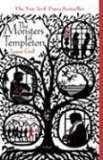Summary | Excerpt | Reading Guide | Reviews | Beyond the Book | Readalikes | Genres & Themes | Author Bio

A Novel
by Lauren Groff
Only in recent years did such coolness arise between Vi and me.
When I was little, I would play cribbage and euchre with my
young mother
until midnight, laughing so hard I never wanted to go to the few
sleepovers
and birthday parties I was invited to. My mother and I held an
odd
relationship with the town, as we were the last remnants of its
founder,
Marmaduke Temple, and direct descendants of the great novelist
Jacob Franklin Temple, whose novels we read every year in high school,
whose link to me would actually make a college professor burst into tears when I
confessed it. But we were too poor and my mother was young,
unmarried,
and too weird with her macrame and loud politics, and so when we
left the safety of our eccentric house, it always felt like Vi and me
against the world. I remember vividly when I was ten or so—which would have made
my mother my age, twenty-eight—listening outside her door as she wept for hours
after being slighted in the grocery store, that one memory standing in for many.
I dreamt at night of being so big I could march down Main Street, grinding our
enemies under my furious ogre's feet.
Alone now in the dawn, I drank the rest of my mother's tea to
melt the block of ice in my gut. Vi was wrong: I did want to come home.
Templeton was to me like a less-important limb, something inherently mine,
something I took for granted. My own tiny, lovely village with great old
mansions and a glorious lake, my own grand little hamlet where everyone knows
your name, but with elaborate little frills that made it unlike anywhere else;
the baseball museum, the Opera, the hospital that had vast arms extending into
the rest of upstate, an odd mix of Podunk and cosmopolitan. I came back when I
had to, to feel safe, to recharge; I just hadn't had to in so long.
For a while I sat alone at the table, watching the crows fall
into the
vegetable garden, pecking at the heirloom vegetables that
thrived every year
under Vi's benign neglect. Then the motorboat that had gone out
before zipped back, and soon more motorboats were roaring out into the
lake like a
vee of geese. Curious, I slid open the glass door and went onto
the porch, in the warming dawn. From where I stood, the hills around Lake
Glimmerglass looked like the haunch end of a sleeping lion, smooth and pelted. I
watched until the motorboats came back into sight, collectively straining to
pull something pale behind them, something enormous and glinting in the new sun.
And that's how I found myself running barefoot over the cold
grass down to Lakefront Park, even as weary as I was at that moment. I
went past our pool, now so thick with algae that it had become a frog pond,
plunking with a thousand belly flops of terror when I passed. I went down the
stretch of lawn, across the concrete bridge over Shadow Brook, trespassed over
Mrs. Harriman's backyard until I stood in the road at Lakefront Park, and
watched the motorboats coast in.
I stood under the bronze statue of the Mohican, the best known
of the characters by our town novelist, Jacob Franklin Temple, and, slowly,
others gathered around me, people from my childhood who nodded at me in
recognition, startled by the great change in my appearance, struck silent by the
solemnity of the moment. Somehow, none of us was surprised.
Templeton is a town of accreted myth: that baseball was invented
here; that
a petrified giant, ten feet tall and pockmarked with age, was
disinterred from under the old mill—a hoax; that ghosts lived among us. And we
had been prepared for this day by the myths we'd always heard about a lake
monster, the childhood tales around campfires in the summer camps on the lake,
the small rumors filtered down. The town crazy, Piddle Smalley, would stand on a
bench in Farkle Park wearing his pants backward—urine-soaked, which is why we
called him Piddle—and shout about the rain-swollen April day when he stood on
the Susquehanna bridge, staring down into the fat river, and something immense
passed by, grinning its black teeth up at him. He'd shriek at the end of his
story Glimmey, Glimmey, Glimmey, as if in invocation.
Excerpted from The Monsters of Templeton by Lauren Groff. Copyright (c) 2008 Lauren Groff. All rights reserved. Published by Voice, an imprint of Hyperion.
Your guide toexceptional books
BookBrowse seeks out and recommends the best in contemporary fiction and nonfiction—books that not only engage and entertain but also deepen our understanding of ourselves and the world around us.